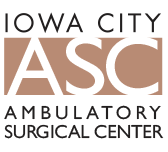What to Expect from Your Cataracts Surgery Recovery
icasc advantage blog
What to Expect from Your Cataracts Surgery Recovery
Posted by iowacityasc on Aug 23, 2023 10:13:45 AM
According to some estimates, there are over 3.7 million cataract surgery procedures in the United States every year. This makes cataract surgery one of the most common surgical procedures you might undergo. When you have cataract surgery, the cloudy and obstructed lens behind your eye is removed via a tiny incision. This lens is then replaced with a new, synthetic version, improving the clarity and vibrancy of your vision.

Because this surgery is so common, many patients have questions about what to expect during cataract surgery recovery.
Immediately After the Procedure
Cataract surgery itself is performed on an outpatient basis. This means that, once the anesthesia wears off, you’ll be allowed to return home the same day as your surgery. Before you leave, you will be given detailed recovery instructions and have a chance to ask any questions you might have.
Because cataract surgery is a minimally invasive procedure, recovery usually goes pretty quickly. You’ll be able to return to almost all of your daily activities within a matter of days or weeks. However, there are some caveats, and it’s important to have realistic expectations before your operation.
For most patients, it may take up to a year for your eye to fully heal from your procedure.
What to Expect After Your Surgery
Recovery will be different for everyone–and every patient at Iowa City ASC will receive personalized recovery instructions. In general, however, patients can expect the following:
- Eye patch: You may be given an eye patch or other form of protective shield to wear during the first 1-3 days after your surgery. This will be especially important to wear while you sleep.
- Do not bend: During the first 48 hours or so, you’ll want to avoid bending so that your head is below your waste. In fact, you will want to avoid anything that may put any additional pressure on your eye (so cough and sneeze as gently as you can).
- You can shower: In general, you’ll be able to shower the day after your surgery procedure, but take care to avoid letting any stream of water make direct contact with your eye.
- Some blurriness may persist: You may experience blurriness in your eye for the first few days or weeks after your procedure. This is because it takes some time for your brain to get used to the clearer information coming from your new lens.
- Redness may persist: You may experience some redness in the whites of your eyes. This is pretty normal, and it should go away in a few days.
- Exercise: You can start with light activity (such as walking) the day after your surgery. Wait until at least one week post-surgery to try anything like jogging. And wait at least two weeks after your surgery to try swimming (always a good idea to talk to your doctor about these, too).
- Watching TV or using a computer: You can typically begin these activities the same day as your surgery (keep in mind, things might still be a bit blurry).
- Eye drops: You will likely be given antibiotic eye drops to take after your procedure. It’s essential that you use these eye drops as directed, as they will help prevent infection.
If you experience any loss of vision, swelling of the eyelid, or flashing lights, contact your provider immediately to get some guidance on what to do.
Patients will be given medication to help control pain and any possible infections. For the vast majority of patients, recovery from cataract surgery is very manageable. If you have any questions, contact your provider to get personalized answers!
Topics: Cataracts
Comments or Questions? Click Here!




